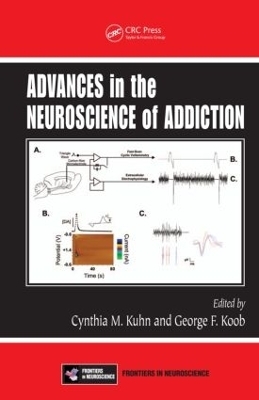
Advances in the Neuroscience of Addiction
Seiten
2010
Crc Press Inc (Verlag)
978-0-8493-7391-6 (ISBN)
Crc Press Inc (Verlag)
978-0-8493-7391-6 (ISBN)
Featuring contributions from leading experts, this book presents an overview of various approaches used to investigate the biologic mechanisms of drug addiction. It includes the behavioral strategies and characteristics of addiction as well as the mechanistic approaches to understanding the underlying neurobiology.
Understanding the phenomenon of long-lasting vulnerability to addiction is essential to developing successful treatments. Written by an international team of authorities in their respective fields, Advances in the Neuroscience of Addiction provides an excellent overview of the available and emerging approaches used to investigate the biologic mechanisms of drug addiction. It also delineates the promising research discoveries being made in relapse prevention.
The book begins with current animal models of addiction, which mimic the state of humans entering treatment: recently-abstinent animals that receive common triggers for relapse (classical conditioning, stress, and neuroadaptive dysregulation). Coverage then shifts to the use of electrophysiologic approaches, which enable researchers to characterize the discharge patterns of single neurons during drug self-administration. After exploring advances in voltammetry and enzyme-linked biosensors for measuring glutamate, the book discusses the theoretical background and results of neuroimaging studies related to neuronal networks that are activated by drug-specific cues. It then describes modern genetic approaches to manipulate target proteins that influence addictive behavior.
The book rounds out its coverage by illustrating how a neuroeconomic approach can inform studies of reward processing in general and addiction in particular. It is a comprehensive introduction to the methodologies of the field for students and beginning researchers and an essential reference source for established investigators.
Understanding the phenomenon of long-lasting vulnerability to addiction is essential to developing successful treatments. Written by an international team of authorities in their respective fields, Advances in the Neuroscience of Addiction provides an excellent overview of the available and emerging approaches used to investigate the biologic mechanisms of drug addiction. It also delineates the promising research discoveries being made in relapse prevention.
The book begins with current animal models of addiction, which mimic the state of humans entering treatment: recently-abstinent animals that receive common triggers for relapse (classical conditioning, stress, and neuroadaptive dysregulation). Coverage then shifts to the use of electrophysiologic approaches, which enable researchers to characterize the discharge patterns of single neurons during drug self-administration. After exploring advances in voltammetry and enzyme-linked biosensors for measuring glutamate, the book discusses the theoretical background and results of neuroimaging studies related to neuronal networks that are activated by drug-specific cues. It then describes modern genetic approaches to manipulate target proteins that influence addictive behavior.
The book rounds out its coverage by illustrating how a neuroeconomic approach can inform studies of reward processing in general and addiction in particular. It is a comprehensive introduction to the methodologies of the field for students and beginning researchers and an essential reference source for established investigators.
Cynthia M. Kuhn, Duke University Medical Center, Durham, North Carolina, USA George F. Koob, The Scripps Research Institute, La Jolla, California, USA
Advances in Animal Models of Relapse for Addiction Research. Application of Chronic Extracellular Recording Method to Studies of Cocaine Self-Administration: Method and Progress. Neurochemistry of Addiction: Monitoring Essential Neurotransmitters of Addiction. Alcohol Craving and Relapse Prediction: Imaging Studies. Integrating Behavioral and Molecular Approaches in Mouse: Self-Administration Studies. Neuroeconomics: Implications for Understanding the Neurobiology of Addiction.
| Erscheint lt. Verlag | 14.4.2010 |
|---|---|
| Reihe/Serie | Frontiers in Neuroscience |
| Zusatzinfo | 8 Illustrations, color; 74 Illustrations, black and white |
| Verlagsort | Bosa Roca |
| Sprache | englisch |
| Maße | 156 x 234 mm |
| Gewicht | 476 g |
| Themenwelt | Medizin / Pharmazie ► Medizinische Fachgebiete ► Suchtkrankheiten |
| ISBN-10 | 0-8493-7391-3 / 0849373913 |
| ISBN-13 | 978-0-8493-7391-6 / 9780849373916 |
| Zustand | Neuware |
| Informationen gemäß Produktsicherheitsverordnung (GPSR) | |
| Haben Sie eine Frage zum Produkt? |
Mehr entdecken
aus dem Bereich
aus dem Bereich
Buch | Softcover (2022)
Lambertus (Verlag)
CHF 37,80


